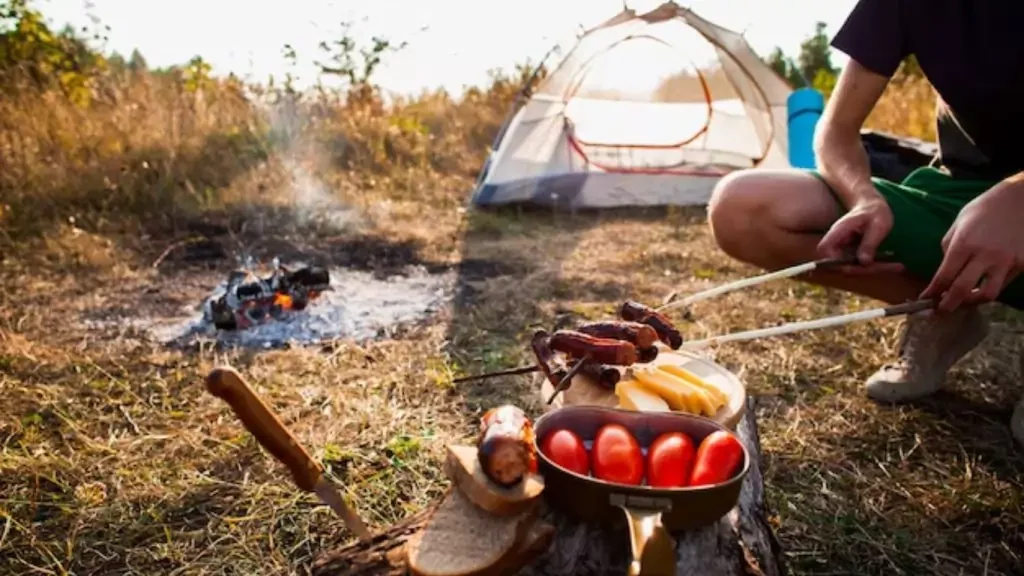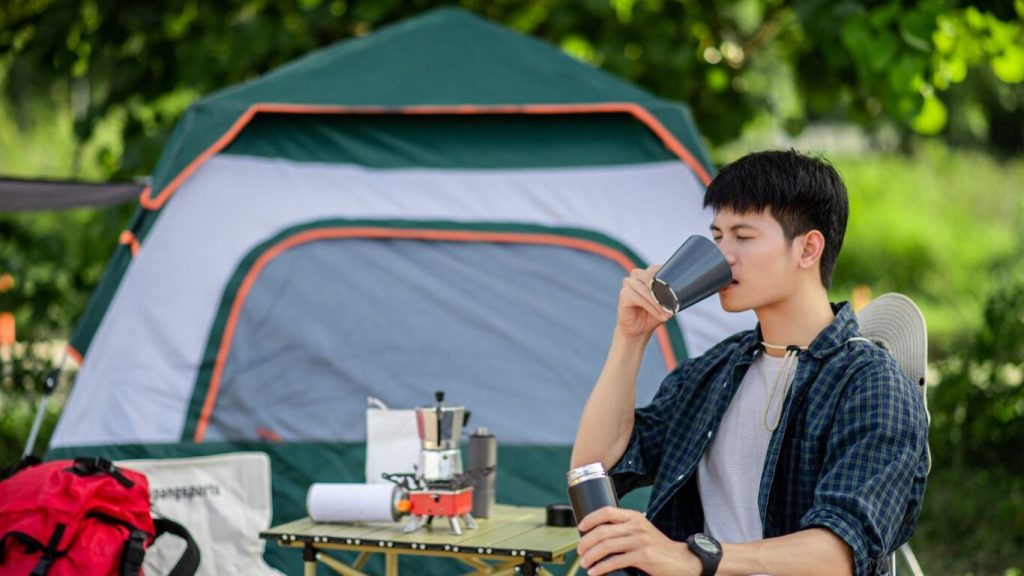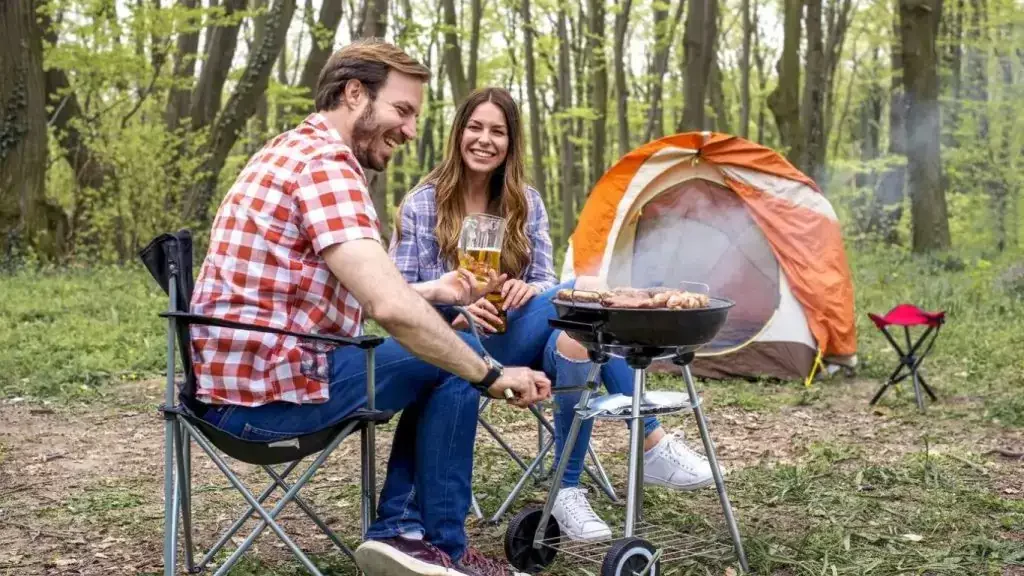Camping is a beloved pastime, offering a chance to reconnect with nature, breathe fresh air, and unwind from the hustle of daily life. However, when it comes to food, camping trips are often synonymous with marshmallows, canned beans, chips, and other convenience foods. While these are undoubtedly tasty and easy, they aren’t always the healthiest choices. The good news? Eating nutritious meals while camping is entirely possible! Here’s how you can stick to a healthy diet even when surrounded by the great outdoors.
Planning is Key
Like all endeavors in healthy eating, preparation is half the battle.
- Menu Planning: Before you head out, sketch a rough meal plan. This ensures you pack what you need and reduces reliance on last-minute, less-healthy options.
- Consider Storage: Think about how you’ll store perishable items. If you have a cooler, prioritize fresh produce, dairy, and meats. For longer trips without refrigeration, focus on non-perishables.

Embrace Whole Foods
- Vegetables: Pre-cut veggies like bell peppers, carrots, and broccoli are great for snacking or grilling.
- Fruits: Opt for fruits that don’t bruise easily like apples, oranges, and berries.
- Proteins: Pre-cooked lean meats, canned fish, beans, and legumes are excellent protein sources. Eggs, either hard-boiled or stored safely, can be versatile additions.
- Whole Grains: Quinoa, whole grain bread, brown rice, or pasta can serve as hearty meal bases.
Healthy Cooking Methods
Camping doesn’t mean you’re limited to charred hot dogs on a stick.
- Grilling: A fantastic way to cook fish, lean meats, and veggies. It uses minimal fat and imparts a smoky flavor.
- Boiling/Steaming: Great for foods like corn, potatoes, or eggs. Consider a portable camp stove.
- Raw: Save fuel and time by eating foods in their natural state. Think salads, nuts, fruits, and raw veggies.

Snack Wisely
It’s easy to mindlessly munch on chips, but with a bit of planning, you can have healthier alternatives:
- Trail Mix: Make your mix with unsalted nuts, seeds, and dried fruits.
- Popcorn: Pop it beforehand or over the campfire.
- Granola Bars: Opt for low-sugar, high-fiber bars or make your homemade batch.
Stay Hydrated
- Water: Always have enough water for drinking. Avoid sugary drinks and sodas.
- Herbal Teas: These can be a warming, caffeine-free alternative in chilly evenings or mornings.
- Limit Alcohol: While a cold beer or wine might be tempting, consume in moderation. Alcohol can dehydrate you, especially during strenuous outdoor activities.
Cook in Bulk
Preparing larger batches of food can save time and fuel:
- Stews and Soups: Made in one pot, they are filling, nutritious, and can last more than one meal.
- Grains: Cook grains in bulk and repurpose them in different meals – as porridge, salad, or side dish.
Read Also : Dealing with Eating Disorder Triggers

Safety First
Healthy eating also means safe eating:
- Storage: Use ice packs to keep perishables cold in a cooler. Store food in tight, waterproof bags/containers.
- Cook Thoroughly: Ensure meats are fully cooked to prevent foodborne illnesses.
- Wash Hands: Before handling food, wash hands with soap or use sanitizing hand gel.
Sustainable Choices
Being in nature amplifies the importance of sustainable choices:
- Packaging: Opt for foods with minimal packaging or biodegradable packaging.
- Waste: Pack all waste out. Leave no trace.
- Local Produce: If possible, source local fruits or veggies. It’s fresher and reduces the carbon footprint.
Supplements and Vitamins
If you’re camping for an extended period, consider taking along some multivitamins to ensure you’re not missing out on essential nutrients.
Experiment and Enjoy
Camping is a great time to try new recipes and enjoy meals by the campfire:
- New Foods: Maybe it’s a fish you caught or a wild berry (ensure it’s safe to eat).
- Cooking Techniques: Experiment with campfire cooking techniques – Dutch oven, pit cooking, or foil packets.

Conclusion
Camping and healthy eating are not mutually exclusive. With a dash of preparation and a sprinkle of creativity, you can enjoy delicious, nutritious meals in the great outdoors. Whether you’re by the lakeside, amidst towering trees, or on a mountain’s edge, making conscious food choices will fuel your body for adventures and leave you feeling good inside out. After all, nature and nourishment are a match made in heaven!
Frequently Ask Questions
Absolutely! With a little planning and preparation, you can maintain a balanced diet even in the great outdoors.
Pre-cut veggies, fruits like apples and oranges, pre-cooked lean meats, canned fish, whole grains, beans, and legumes are all portable and nutritious options.
Consider using a cooler with ice packs for short trips. For longer trips, prioritize non-perishable items and consume perishables during the initial days.
Grilling, boiling/steaming, and eating raw foods are all nutritious options while camping. Using a portable camp stove can also be beneficial.
Planning is crucial. Pack healthy alternatives like homemade trail mix, popcorn, and low-sugar granola bars. Having these on hand reduces the temptation to consume less healthy options.
Staying hydrated is essential. Always ensure you have sufficient water for drinking, especially if you’re unsure about the availability of clean water sources at your camping destination.
Store perishables in a cool environment using ice packs. Ensure meats are cooked thoroughly, and always wash or sanitize your hands before handling food.
Opt for foods with minimal or biodegradable packaging, pack out all waste, and consider sourcing local produce when possible.
Experiment with new recipes, try different campfire cooking techniques, and integrate local foods or wild edibles (ensuring they’re safe to eat) for a unique camping dining experience.
Remember, camping is an opportunity to connect with nature, and making healthy food choices can enhance your overall experience, providing the energy and nourishment needed for your outdoor adventures.

[…] Read Also : How to Eat Healthy While Camping […]